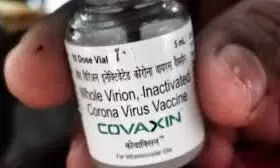
Bharat Biotech defends Covaxin's safety amid study highlighting side effects
text_fieldsBharat Biotech has defended the safety of its Covid-19 vaccine, Covaxin, following a study by researchers at Banaras Hindu University (BHU) which indicated that nearly one-third of recipients reported adverse events within a year.
The study revealed that nearly one-third of individuals who received at least one dose of Covaxin experienced "adverse events of special interest" (AESIs) within a year of vaccination. These AESIs are significant medical events that require careful monitoring and further investigation to establish any causal links to the vaccine.
Conducted between January 2022 and August 2023, the peer-reviewed study was published in the journal Springer Nature. It involved 926 participants, including 635 adolescents and 291 adults, who received the BBV152 vaccine, Covaxin’s development name. Participants were interviewed regarding AESIs they experienced within a year of vaccination, with questions focusing on events beyond common side effects like fever and soreness.
Responding to the study, Bharat Biotech emphasized that multiple studies have demonstrated Covaxin's "excellent safety track record." The company highlighted the need for additional data points to ensure the study's effectiveness and avoid investigator bias. These include the AESI safety profile of participants prior to the study, a comparison of the safety profiles of non-vaccinated subjects, and a comparison with those who received other vaccines.
Bharat Biotech also stressed the importance of following all study participants throughout the study period, rather than just a subset.
The study found that nearly 50% of participants reported infections within a year of receiving Covaxin, with many experiencing viral upper respiratory tract infections. Serious AESIs, such as strokes and Guillain-Barre syndrome, an autoimmune nervous disorder, were observed in 1% of the participants.
For adolescents, the most common disorders post-vaccination included new-onset skin and subcutaneous disorders, general disorders, and nervous system disorders. Among adults, common AESIs were musculoskeletal disorders, general disorders, and nervous system disorders.
The study also reported menstrual abnormalities in 4.6% of female participants, ocular abnormalities (vision-related issues) in 2.7%, and hypothyroidism in 0.6%. Four deaths were reported within the study sample, with strokes causing two of these. One death was due to post-Covid-19 rhinocerebral mucormycosis, a rare fungal infection, according to the patient’s caregivers. The fourth death involved a woman who suffered multiple episodes of unconsciousness post-vaccination; the cause of her death remains undetermined due to a lack of definite causality.
The researchers recommended extensive surveillance of vaccinated individuals to understand the long-term effects and outcomes of late-onset AESIs potentially linked to the vaccine. They found that individuals who received three doses of BBV152 were four times more likely to report AESIs compared to those who received two doses.
This study emerges shortly after AstraZeneca announced the global withdrawal of its Covid-19 vaccine due to an oversupply of updated vaccines. This follows AstraZeneca's court documents acknowledging that its vaccine could cause a rare but serious side effect, thrombosis with thrombocytopenia syndrome (TTS), characterized by blood clotting and low platelet levels. In India, the Oxford-AstraZeneca vaccine is marketed as Covishield and produced by the Serum Institute of India in Pune.























